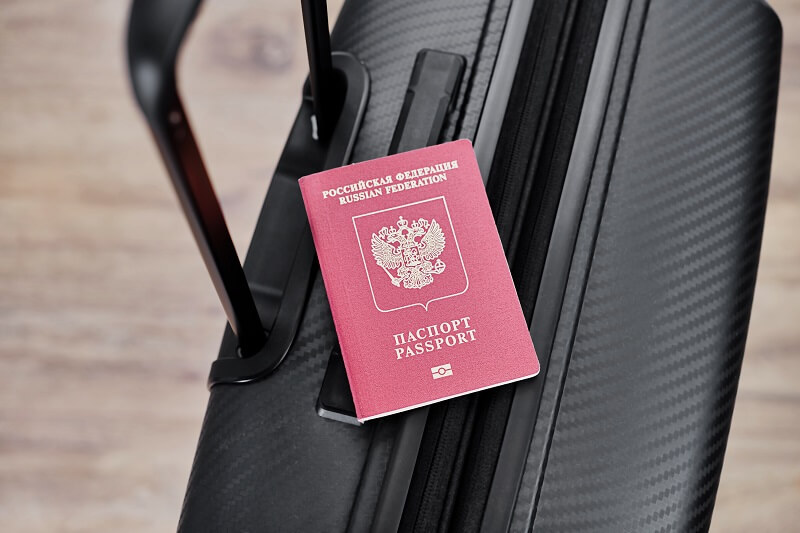On Friday, 9 September the European Commission published new, stricter guidelines for the consulates of European Member States when they handle short-term visa applications from Russian citizens.
In a statement the Commission said that the conflict between Russia and Ukraine has increased the security risks faced by the EU and added that the time has come for consulates to take these risks into account when dealing with Russian short-term visa applications.
This might in some cases cause a visa application to be rejected and also visas that have already been approved being revoked. Visa applicants from Russia who want to travel to the EU for non-essential purposes can also expect the application to be a more thorough and take longer from here on. The new guidelines aim to ensure that consulates follow a more consistent approach in future.
The latest guidelines will, however, not completely close European borders to visitors from Russia. The EU will stay open to Russians who want to travel to the region for essential purposes such visiting family members in the EU. Civil society representatives, dissidents, and journalists can also still apply for EU visas.
The new guidelines come after at an informal gathering on 31 August European Foreign Affairs Ministers reached a political agreement on a coordinated and common road forward as far as issuing visas to Russian citizens is concerned.
Following this meeting, the European Council adopted an official decision to suspend the Visa Facilitation Agreement between the EU and Russia and to give EU member states more discretion when they process short-term visa applications from Russian travellers.
Responding to the decision, Margaritis Schinas, the VP for Promoting our European Way of Life, said that, under current circumstances EU consulates operating in Russia will have to scrutinise applications for EU short-stay visas much more strictly. Schinas added that the latest decision will ensured that this is based on transparent, clear, and common principles. He concluded by saying that the EU will acting as one in this regard.
Viva Johansson, the EU Commissioner for Home Affairs, commented by saying travelling to the EU as a tourist was not a basic right. With the new guidelines, she added, members states will be requested to thoroughly scrutinise visa applications from Russian visitors. Applications should be rejected wherever a security risk is identified by the consulate. The latter should also give lower priority to applications from Russian citizens who want to travel to the EU for non-essential purposes. The EU, she went on to say, will stay open to individuals who have to be protected, such as dissidents, journalists, those who travel for family reasons, and human rights activists.
A Longer And More Rigorous Visa Application Process For Russians
EU consulates will now be able to adjust the procedures for dealing with short-stay visa application originating from Russia by using all the current options offered by the EU visa rules. Given the increased risks posed by the Russia/Ukraine conflict this will help to ensure that visa applications are better scrutinised.
The fact that Russia decided to expel the diplomatic and consular staff of many EU member states also makes it necessary to adjust the procedures for short-stay visa applications from this country because it caused EU consulates to operate with significantly reduced capacity.
Given The Circumstances, Consulates Will Be Able To:
– Ask for more supporting documentation – The consulates of member states could, for example, ask the applicant to provide documents that are not on the standard list. This will ensure increased levels of scrutiny, particularly in situations where there might be a threat to public order, public policy, or international relations.
– Deprioritise travel that is not absolutely essential – Consulates will be expected to deprioritise visa short-stay visa applications and appointments when they do not see an essential reason for the visit, for example, tourists.
– Extend the time for making a decision about a visa application – Consulates will now be allowed to take as long as 45 days to decide whether to approve or reject a visa application instead of the current 15 days. This will allow more time for applications to be more thoroughly checked.
– Improve scrutiny over both existing visas and visa applications – Taking into account the present security situation, the consulates of EU member states have to diligently check the visa applications of Russian citizens, particularly those applying for short-term visas, to determine whether or not they form a threat to the internal security, public policy, or international relations of any or all EU member states.
If an individual assessment finds this to be the case, the visa application should be rejected. EU member states should also reject a visa application if there is any doubt regarding the visa applicant’s plans to leave the European Union when his or her visa expires.
In a similar vein, EU member states should also follow the same strict approach when they reassess existing short-term visas that have been issued to citizens of Russia. If it should at any stage become clear that the conditions that originally led to the visa being issued are no longer valid, for example, the visa recipient have since become a security threat, the existing visa should be revoked.
EU member states are also expected not to issue multiple-entry visas for extended periods of time. The reason for this is that Russian visa applicants might as time passes no longer meet the original conditions for being allowed entry into the EU because of political developments and decisions or economic instability in Russia. In these instances Member States should rather consider issuing visas for shorter periods of time or single-entry visas.
Under current EU visa rules an EU member state can also request that it should be consulted before one of the other EU states issues a visa to a Russian applicant. Acceptable reasons for such a request include internal security, public policy risks, or international relations. Upon being consulted, such a member state will then be able to raise an objection to the Schengen visa being issued to the particular Russian applicant. If the other member state should decide to go ahead with issuing the visa, it would only be valid in the territory of that state, i.e. it will provide access to the whole Schengen region.
The European Union will, however, stay open to visa applications from Russians who want to visit the region for essential purposes, for example, journalists, visiting family members in the EU, representatives of civil society, and dissidents.
The latest guidelines encourage member nations to use the existing framework when catering for these cases. Under the visa rules, member states are e.g. allowed to waive or reduce the visa fee in special circumstances. This could make it easier for researchers, students, pupils, dissidents, and journalists who want to travel to the EU.
What To Expect Next
The new guidelines will help the consulates of member states in dealing with visa applications from Russian visitors and to implement the decisions taken on Friday. To facilitate a coordinated approach, member states will exchange information about the implementation of these guidelines on a regular basis. This will be coordinated both at local level and also by the EU Delegation to Russia and the dedicated working group for visa issues. Member states will also be expected to report to the EU Commission on a regular basis.
The Background To The Current Situation
On an informal meeting held on the last day of August, the EU Foreign Affairs Ministers negotiated a political agreement on a shared, coordinated approach for issuing visas to Russian applicants.
As part of this the EU suspended its Visa Facilitation Agreement with Russia. It will also in future adopt a common approach when it comes to not recognizing Russian passports that were issued in occupied foreign territories (as suggested by the European Commission last week). EU Ministers also reached an agreement that Russian visa applications will still be processed, although on a strictly individual basis after taking into account the particular circumstances.
The Bottom Line
The latest visa guidelines followed on the heels of the agreement that was reached by EU foreign affairs Ministers regarding visa applications submitted by Russian applicants and under which circumstances to reassess visas already issued to Russian citizens.




